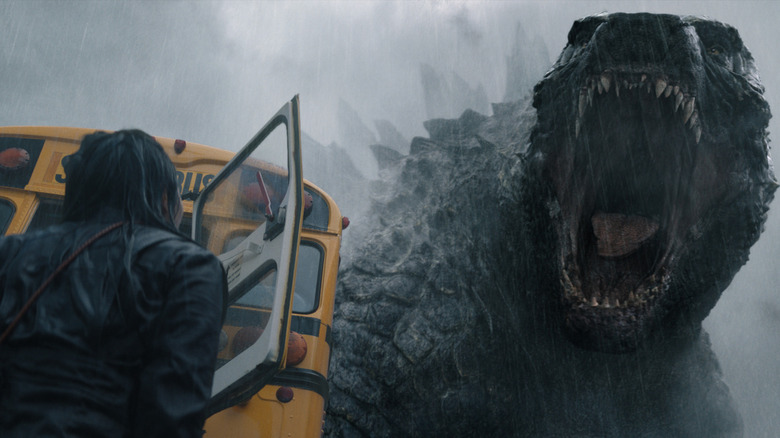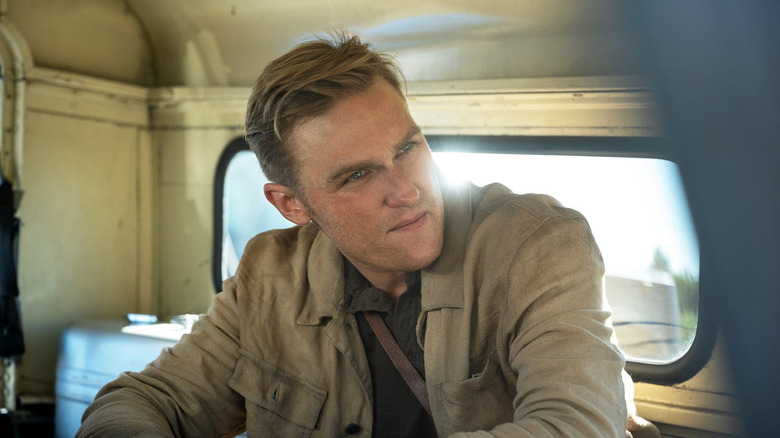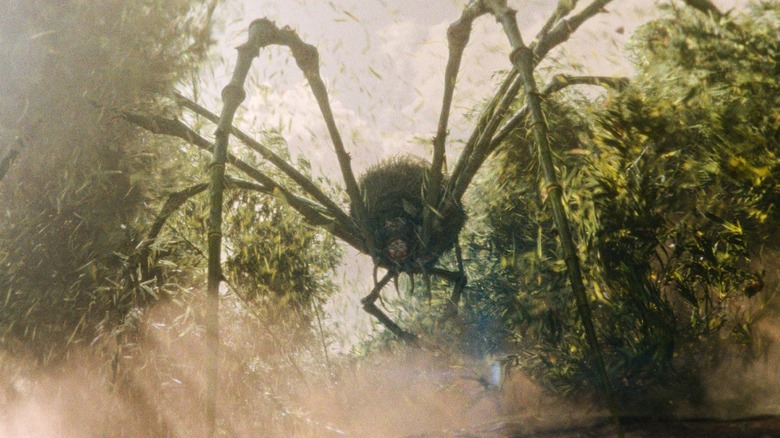Monarch: Legacy Of Monsters Creators On Bringing The MonsterVerse To The Small Screen [Exclusive Interview]
It is no small thing to take a franchise that is rooted in cinematic storytelling and scale it down for TV. But that's exactly what was asked of the team behind "Monarch: Legacy of Monsters," which premieres on Apple TV+ this week. Taking place in the MonsterVerse alongside movies such as "Godzilla" (2014) and "Kong: Skull Island," the series brings the King of the Monsters (and many other monsters) to the world of streaming.
The show takes place after the events of Gareth Edwards' 2014 film, but it also brings us back five decades earlier to show us the origins of Monarch, the mysterious organization that studies these giant creatures. It's an ambitious storyline that spans generations, with Kurt Russell and his son Wyatt Russell playing the same character in different eras. We're also talking about stretching a story out across ten episodes, not just two hours. It's a lot.
Tasked with making it all work was showrunner Chris Black, known for his work on "Severance," as well as comic book writer Matt Fraction, known for his comic book work writing superheroes such as "Hawkeye." But he was pretty new to TV. Also on board was Matt Shakman, who helmed the Emmy-winning "WandaVision" for Disney+ and is currently on deck to direct the "Fantastic Four" reboot. This rag-tag team was responsible for bringing Godzilla and the Titans to the small screen.
I had the good fortune of speaking with the trio of filmmakers in honor of the show's premiere. We discussed how they approached crafting the human-focused story, Bigfoot in the MonsterVerse, landing on the show's title, and more.
Note: This interview has been lightly edited for clarity and brevity.
'It's television, doing what television does best'
Thank you so much for taking the time. I can't recall a time in my life when I didn't love Godzilla, so getting to talk to people who have had some influence over that is very meaningful to me.
Black: He's very difficult to work with.
I can only imagine. On that note, dealing with Apple, dealing with bringing Godzilla to TV, we've got a big long series here as opposed to a movie. How tough was it for you guys in the development process, knowing that you'd be, I would assume, limited a little bit in terms of the monster action you'd be able to deliver? You couldn't just have 10 episodes full of monster battles. So was that a bit of a challenge for you guys developing this whole thing?
Fraction: I think working with Apple and working with Legendary and Toho, our ambition was to tell a story for television. We can't compete with those films. They're such massive, epic spectacles, but they're films, they're things we buy tickets for. We go out with our friends to watch in big crowds on these big screens as a kind of community collective experience. TV is a thing you invite into your home, you spend time with over weeks and weeks. So we wanted to make this a show. We didn't want to make it a scaled-down version. We didn't want to turn it into "monster of the week." We didn't want it to be the bad version of those movies. We wanted it to be the good version — as good of a version as we could manage — of a show set in this world. That begins with human characters, and the idea that we could start our Godzilla show in a world where everyone knows Godzilla is real. Now what? That's an incredible starting point to tell stories.
Chris had this kind of astonishingly great conception of this guy with two families and it all comes out after this global catastrophe. That's just such an intriguing story of this brother and sister trying to figure out the mystery of who their father was. As we would kind of shorthand it in the room, the giant monsters keep getting in the way.
Black: You talk about the challenges of the development process, which are legendary in Hollywood, but I think for us, the only real challenges that Legendary and Apple presented us with was, this has got to be great. It's got to be great. The bar is set so high. People can't look at this and feel like, "Oh, it's the cheap TV version of these movies." It has got to blow everyone away, both in terms of the storytelling and the filming.
Matt Shakman, for you then as the director, how hard was that for you to approach? "I've got to make this feel cinematic like people expect from this stuff, but for TV." Was that a challenge for you?
Shakman: No, I mean, I think it's what these gentlemen here have said, which is that what they built was this beautiful multi-generational family drama and mystery and puzzle set within a monster universe. So it's human-centric by definition and there's still incredible scale and scope, but you're seeing it from the ground level. So instead of being up there in the sky as Kong fights Godzilla, which is amazing and great, and I want to see that, too, we want to be down on the ground and realize what the impact of that kind of fight has on the humans on the ground.
It's just as exciting, if not more so and more visceral to be down there, and feeling your world change by the introduction of these unfathomable forces and these creatures. This show is not dramatic scene, spectacle scene, dramatic scene. They are interwoven together because how these monsters impact these people changes them, affects the course of their lives, brings them together, throws them apart, and it's all part of the dramatic engine of the show. It's television, doing what television does best.
Black: But the one thing I do want to say about Matt is I don't want him to undersell or undervalue what he brought to this visually. His filmmaker's eye. His episode, it looks like a feature film for television. It's really spectacular. He was absolutely relentless and meticulous in making sure that every moment was being sold on screen the way it needed to be sold.
Fraction: I think to that end, because you have so many layers of humans and authentic worlds, and real locations that we shot in, those monsters become so much more real to me, right? Because you're seeing them through the eyes of people, you're seeing them through layers of humanity and things that you know are true, and it helps make them feel even more real, I think, than when you're living up there in the stratosphere.
'We didn't want to limit it to one Titan'
When this was first announced, we didn't know the title. A lot of us in my industry were just referring to it as the MonsterVerse TV show. How did you guys arrive at the title, and was there any consideration for putting the word Godzilla in the title at all? Or was it always what it is now?
Black: It wasn't always what it is now. I will be honest: It went through a lot of titles. There was a lot of internal debate about what the perfect title for the show was, and having the right title. We all knew in terms of an identifier for the show and the story was incredibly important. We explored a lot of titles that felt more throwbacks to the sort of Toho universe. I think at the end of the day, we decided we didn't want to limit it to one Titan, to one creature. It needed to be about the broader universe. I'm actually, at the end of the day, really very happy with the title, particularly "Legacy of Monsters," because it is about legacy — family legacy, human legacy — as much as it is about monsters. It felt like it really landed on something, for me anyway, that worked for the show.
Speaking of monsters, I have an important question here: Is Bigfoot canon in the MonsterVerse?
Black: I can neither confirm nor deny the existence of Bigfoot.
Matt Fraction, for you real quick: I am an enormous comic book reader and your work actually helped get me back into comics about 10 or 12 years ago. I know you've done some TV work, but this is the first time you've been heavily involved in a TV show, if I'm not mistaken. How did it come to be that this was the show that took you in that direction?
Fraction: I was working with Legendary, and had an overall deal with the studio to develop some of my books. As we were getting to know one another and explore that stuff, they were like, "Oh, hey, there's these other things we have." And I have been a lifelong fan of the MonsterVerse and felt strongly there was a show that could exist there that was very much like the show we've made, perhaps foolishly because it was so new to me, and maybe because I hadn't had a ton of experiences like, "Let's go for that." I, even in retrospect, remember a couple of dear friends at the studio being like, "Are you sure?" And I was like, "Yeah, it's great. I love it! What could possibly go wrong?" So I don't think I knew...
Black: It was a hill many men had died on.
Fraction: Yeah, I was just sort of like, "Oh, look at this great hill. There are so many easy footholds to climb." I was too new to know better that I was taking on an epic spectacle, a massive producorial and creative endeavor. But I loved the world, I love Godzilla, and I loved the idea of doing serial narrative, a television story in that world, not scaling down a movie story, but getting to go live in that world for 10 episodes. There are as many minutes of our show as there are movies at this point. In a single season, we've doubled the amount of time you get to live in this world. Because it was a show, it would be with people, it would be about the reality and the grit and the texture of a world where everyone knows Godzilla and the Titans are a thing. What does that mean for us? It's just such fertile ground for a show that I leapt for it.
"Monarch: Legacy of Monsters" premieres November 17, 2023, on Apple TV+.


